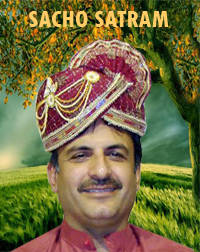In one of the deeply insightful Satsangs, Hazir Swaroop Sai Sadhram Saheb graciously shared that Ekantvas Thursday is a blessed day dedicated to introspection. It is the day to sit with oneself, to reflect inwardly, and gently realign the course of our lives, so that we may live fully, meaningfully, and in tune with the higher purpose of our birth.
Through sincere introspection, we learn how to manage time and attention wisely. We begin to understand our own behavior, our strengths and weaknesses, our gains and losses, our health and habits. We discover how much of our time is spent in positive, productive action, and how much is lost to distractions. Such clarity inspires us to move forward with purpose and positivity, and helps us to grow inwardly and outwardly.
When we look within, we also become aware of the free time that remains beyond our daily obligations. How we utilize this time shapes the very fabric of our life. Saijan lovingly reminded us that if this time is spent in Seva, in uplifting others, in remembering the Divine Name (Naam), or in any Dharmic or spiritual effort, then that time becomes a blessing—it becomes sacred. Time thus spent helps us recognize our true Self, our inner purity, and strengthens the light within us.
To have free time after fulfilling our worldly duties is a divine gift. And that gift, if used for Dharmic living, enhances the soul’s journey.
Often people ask what they truly gain from Pooja and Paathh. In truth, when we engage in Naam Jaap, Simran, and selfless deeds, our life is transformed. Our thoughts become refined, our mind becomes focused, and our life takes on a deeper meaning.
Every thought we harbor in our mind releases certain energies. Our recurring thoughts form patterns, and these patterns shape our destiny. Saijan shared that he has seen people who had immense wealth, yet they constantly complained and remained ungrateful. Eventually, their negative mindset led to their downfall. On the other hand, those who lived with contentment and gratitude—regardless of their wealth, experienced growth and peace. Such people always acknowledged the blessings they had, and their positive approach brought more joy and abundance into their lives.
Saijan recalled an incident where a man constantly complained about his son. Shahanshah Satguru lovingly advised him to begin praising his son and speak positively about him. As the man followed this guidance with sincerity, his son gradually transformed into a noble and kind hearted person. This clearly shows how the vibrations of our words and thoughts influence our reality.
Our thoughts, our surroundings, and the company we keep deeply affect the way we live. If we cultivate positive thinking, even during illness or adversity, it supports healing and uplifts our spirit. On the contrary, if we dwell in negativity, our health and life deteriorate further. Positive thinking is not just a practice; it is a divine force that draws goodness toward us.
When we immerse ourselves in Nem, Dhyan, Simran, and Satkarm (good actions), our life begins to change. Our thoughts become serene, our wrongdoings lessen, our character improves, our health benefits, and we start living a life of harmony and fulfillment.
Hazir Swaroop Sai Sadhram Saheb has often emphasized that introspection is the key to understand the quality of our life. It enables us to differentiate between good and bad, to purify our thoughts, and to consciously choose a life of virtue and meaning.
By reflecting inwardly, we learn how to structure our daily life in a better way, and we find time to walk the path of truth as human beings meant to evolve.
It is crucial to recognize how we are utilizing the moments of free time given to us. Are we investing it in good karma, or wasting it in ways that will only bring inner decline? The fruit of our karma shapes our future. If we sow seeds of goodness, we reap the blessings of goodness. Likewise, the time we get beyond our daily responsibilities is a sacred opportunity, a divine allowance to grow spiritually.
Saijan reminded us that if we earn profits through business or work, we must dedicate a portion of that for selfless causes. Using all our earnings solely for our personal comforts without serving others could eventually lead to misfortune. We must always remember that we reap what we sow.
Hazir Swaroop Sai Sadhram Saheb has lovingly taught that the extra time we receive in our lives is a gift from the Divine—an opportunity to beautify our life and fulfill our spiritual purpose as human beings.
The more we invest our time in noble deeds, the greater the returns we shall receive, not just in this world, but for eternity. Introspection brings awareness of our inner tendencies—what habits to let go of, what energies to cultivate, and where our time is being wasted. Introspection is a moment of truthfulness—between you and your own soul.
We must become mindful of how we invest our time. Our good karmas belong solely to us, and our misdeeds are ours to rectify—no one can claim either.
Hazir Swaroop Sai Sadhram Saheb Said that Most of our time gets spent in worldly interactions, listening, speaking, thinking, working. But the time for Ekantvas, the sacred solitude, is the time reserved just for you. Sit with yourself. Sit in Nem, Dhyan, Simran, Pooja, and Paathh. That time is your time to rise, to purify, and to connect deeply with the Divine within.



